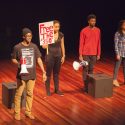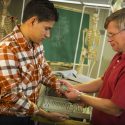New professor tackles diversity through theater
Let’s say a guy in full Ku Klux Klan regalia is standing in line behind you, an African-American woman, at the grocery store.
What happens next?
In this 12-minute original presentation, participants might be called upon to swap roles or improvise responses, but there is one rule:
“No one magically can resolve the types of tensions that realistically would exist between these two people,” says Patrick Sims, assistant professor of theatre and drama new this fall to UW–Madison.
Welcome to Theatre for Cultural and Social Awareness, an outreach program that Sims is creating to address sensitive subjects in the community and/or workplace. Students in Sims’ class of the same name wrestle with such thorny issues every time they meet: hate crimes, affirmative action, post-9/11 fear of Islam, privilege. “That one is often the most sensitive issue of all, because it really hits close to home,” Sims says.
Students deconstruct various plays, films and current events, examining them from different points of view. For example, recent discussion centered around Tracey Scott Wilson’s “The Story,” a Milwaukee Repertory Theatre production in which Sims appeared.
“The play deals with a Janet Cooke incident,” Sims says. Cooke was the Pulitzer Prize-winning Washington Post journalist who fabricated a story about a boy involved in the heroin trade.
Sims will continue with the play in Chicago at the Goodman Theatre. He plays Neal, a junior editor on the Outlook (African-American) page. “The feeling is, the fact that she fabricated the story will reflect on all the members of the African-American community,” he says. “One of the characters fears that if they say something about the made-up story, management will take Outlook away from black journalists. Those political and social realities are what we explore in my class.”
Into this decidedly gray-shaded atmosphere stepped Alison Horn at the beginning of her first semester of her first year at UW–Madison. Although it’s not an easy A, Horn calls the course a refreshing breath of fresh air.
“I get the sense that the things I pull out of class might help me do something personally to raise awareness and work for equality between races, genders and sexual orientations,” says Horn, who plans to major in political science and possibly business.
Sims says that his approach to diversity training is in its infancy at UW–Madison. “We’re testing the waters this semester,” he says. The eventual plan is to offer a permanent course in fall 2005 and have those students work with area businesses and organizations.
Actually, Sims has been there and done that, just not in Madison. In his previous position on the theater faculty at UW-Milwaukee, he and his students took their 12-minute scenarios to corporate giants such as Harley-Davidson Motor Co. and Miller Brewing Co.
“The clients outline what their concerns are, and we write scenarios to fit them,” he says. “Seeing us enact their issues gives all the participants a chance to breathe. There’s no finger-pointing. We simply present both sides of the issue as a way to spark safe conversation about it.”
In one particularly edgy piece, a black Muslim arrives at a business meeting dressed in ceremonial garb.
“After the skit, an African-American woman came up to me in tears. She said she had just converted to Islam and that this brief play had changed her life. She said that we showed what she had been trying to communicate herself about her new faith. She said we shattered the stereotypes,” Sims says.
His class also seems to be in the process of transforming his students. Martine Green, for example, is a Ph.D. candidate in theatre and drama.
“I told Patrick that his class is forcing me out of my box of like-minded people. I now have to face people who have different views about the world than I do and learn how these differences contribute to learning and the creative process,” she says.
Green says she’s finding various dialogue styles particularly useful in addressing issues of difference. Brian Proball, a master of fine arts candidate in scene design, also welcomes the practical methods the class has been providing.
“My work before grad school included being a residency artist for the Minnesota State Arts Board. This course is giving me additional techniques to bring to a classroom,” he says. “The class is helping me clarify and solidify what my stance is on important issues that can come up in a class.”
Sims himself grew up in Chicago. As the youngest of three sons and the first to go to college, he says he comes from a background of seeing both sides.
“There’s a huge cultural shift from growing up in the ghetto to having a career in academia,” he says. “I’ve been very blessed in my journey, and the thing that made a difference for me was theater. So it’s important to give back the very tool that helped transform me and allowed me to see the possibilities that life has to offer.”
Sims’ students will offer a workshop for students at 2 p.m. Thursday, Dec. 16, in the Chadbourne Residential College. For more information about it or Sims’ plans, contact the Department of Theatre and Drama at 263-2329.



